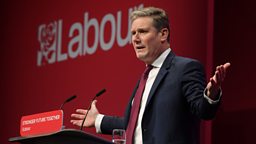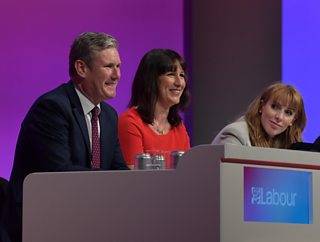Nine things we learned about Keir Starmer
In a wide-ranging and engrossing interview with Nick Robinson on Political Thinking, the Labour leader, Sir Keir Starmer, is keen to play down any idea that an election win in 2024 is a foregone conclusion – and points out why drawing lessons from the past is a double-edged sword. He also reveals how his family and his career have fuelled his vision of change.
Here are nine things that we learned about Sir Keir Starmer…

1. He doesn’t think the parallels with 1997 are relevant
Following an extended period of his party riding high in the opinion polls - as was the case ahead of the 1997 election - some have been keen to draw comparisons between now and then. However, Sir Keir is aware that the mood of the time was one of optimism and hope, and that the party’s borrowed anthem ‘Things Can Only Get Better’ “chimed with the times but it wouldn’t now.” What Labour needs to do for the electorate in a time of uncertainty, he says, is “weld together the reassurance that they need, with the hope that things can change.”
One of the reasons I've been talking about shattering the class ceiling is because the idea that your future may be more determined by what your parents earned than your own ability is unforgivable.Sir Keir Starmer
2. He doesn’t like losing
Sir Keir describes himself as having “a very clear sense of purpose”, and that extends to ‘friendly’ games of football, including one that took place between English and Scottish Labour Party figures. Scottish Labour leader and captain of their team, Anas Sarwar complained on a previous edition of Political Thinking that the referee -one of Keir Starmer’s members of staff - had added on 35 minutes and enabled the England team to come from behind and win. “It is true that the final whistle went soon after we went ahead,” admits Sir Keir, “but there's no way Anas can backslide out of that result. I realised then it was about my passion for winning - but also that I’d never hear the end of it if we didn’t win this.”
3. Disrespect winds him up
While he isn’t a fan of losing, Sir Keir describes “not respecting people for who they are” as a pet hate. This stems, in part, from the treatment of his father, a factory worker, when he was in the company of other professionals who would look down on him. This made his father “shrink into himself and withdraw.” Sir Keir’s concept of respect was also shaped by his brother overcoming learning difficulties. “My mum and dad instilled in me that his success in life was just as good as mine, and so the disrespect which comes with calling people thick really winds me up. I will never accept that.”
4. He wants to smash the ‘class ceiling’
The classism suffered by his father is sometimes evident today, with some people, Nick contends, preferring to distance themselves from their working-class upbringing because of a sense of awkwardness. Sir Keir feels this comes from a “complete misunderstanding of what it is to be working class” and that “it's wrong to suggest that the ordinary hope of working-class people isn't to get on and to better yourself.” He says that breaking links with the past is important in one sense. “One of the reasons I've been talking about shattering the class ceiling is because the idea that your future may be more determined by what your parents earned than your own ability is unforgivable.”
5. He thinks his mother would approve of his plans for the NHS
When she was suffering from Still’s disease, Sir Keir’s mother was adamant that she didn’t want private healthcare. The Labour leader doesn’t believe that his idea of reform now means the private sector will be inextricably involved in the NHS, however, he thinks that private hospitals can help bring waiting lists down. This approach would, he says, “make sure that the NHS survives for the next 75 years in the way it survived for the last 75 years, and she [my mum] would be up for that.”

6. Working on the Good Friday Agreement taught him flexibility is essential
Sir Keir describes pledges made when he was running for Labour Party leader, such as tax rises on the rich, abolishing tuition fees, common ownership of rail and water, and free movement of people after leaving the EU, as “broad reflections of value”, and he doesn’t see re-evaluating them as a bad thing. Citing his work as an advisor on the Good Friday Agreement, he says “if every single person who entered the room simply said, ‘I'm going to stick to my long held position, I refuse to adjust in any way,’ then we wouldn't be where we are in Northern Ireland, and that would be an absolute travesty.”
7. He has to be more security conscious now
Anticipation of a Labour victory at the next election and the positioning of Sir Keir as a leader-in-waiting has raised the stakes, including in his family life. “We do have to be very security conscious now in a way that we weren't before,” he says. “When my wife and I go out for a wedding anniversary, we book a nice restaurant, and on the next table we have our protection team, and they're absolutely fantastic - no complaints there - but it is a different environment for my family.”
8. He worries about his kids…
Given his raised profile, he is concerned about what impact an election win might have on his 15-year-old son and his daughter, who is 12. “I'm really not daunted about the difficult decisions we have to make in government, if we get that far,” he says, “I am worried about my children. How we protect them through this is the probably the single thing that keeps me awake.”
9. …but, for now, they are taking the attention in their stride
His daughter has already told him that she is not going to Downing Street if her father wins the next election, meanwhile his son is also quite matter-of-fact about all of the attention on his dad. When Sir Keir won Spectator Politician of the Year, he showed the certificate to his son. Without looking up from the television, his son’s response was: “How did you blag that then?”
More from Βι¶ΉΤΌΕΔ Radio 4
-
![]()
The Today Podcast
Amol and Nick's take on the biggest stories of the week.
-
![]()
Amol Rajan Interviews...
Amol Rajan interviews the era-defining pioneers who are shaping our rapidly changing 21st-century world.
-
![]()
When it Hits the Fan
Inside the world of crisis managers as David Yelland and Simon Lewis watch the week's biggest PR disasters unfold.
-
![]()
Young Again
Kirsty Young takes her guests back to meet their younger selves.





